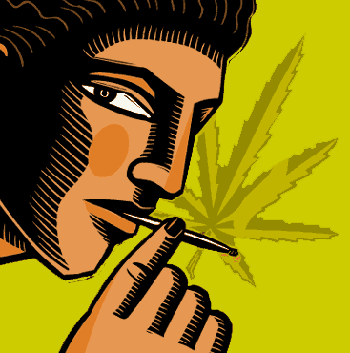White House drug czar links marijuana use and depression
The Office National Drug Control Policy says smoking pot increases risk of mental disorders, but critics contend that the report stretches the evidence.

By James Hohmann
Los Angeles Times Staff Writer
May 10, 2008
WASHINGTON — The White House drug czar said in a warning to parents Friday that depressed teens are medicating themselves with marijuana, running risks of even deeper depression.
A new report by the Office of National Drug Control Policy said that frequent marijuana ingestion doubles a teen's risk of depression and anxiety, based on data compiled from published studies.
The report, timed to be released during Mental Health Awareness Month, cited a study that marijuana use increases the risk of developing mental disorders later in life by 40%.
"In short, marijuana makes a bad situation worse," said John P. Walters, director of the drug control policy office.
Critics said the administration was trying to scare teenagers by exaggerating the dangers.
"When you start convincing young people and their parents that marijuana is the cause of problems rather than the symptom of them, you can get into real problems," said Bruce Mirken, spokesman for the Washington-based Marijuana Policy Project, which advocates decriminalization of the drug. "It may cause people, parents, teens and counselors to overlook the real cause of the problem."
Some addiction experts said the report stretches evidence by implying a causal link between smoking pot and developing mental illness that does not exist, even if there is consensus that depression is a risk factor for drug use.
A British government advisory group concluded in a report last month that there was not convincing evidence to show "a causal relationship between the use of cannabis and the development of any affective disorder."
Questioned about the drug control policy report's claim that "using marijuana can cause depression and other mental illnesses," Walters demurred and acknowledged there is no proof one leads to another.
"Marijuana makes things worse, not only for young people in general, but it particularly makes things worse with regard to mental health and depression," he said.
Among experts inside and outside the government, opinions are mixed on the relationship between teen depression and marijuana use.
"Both conditions could be related to something else," Dr. Victor Reus, a psychiatrist at UC San Francisco, said in an interview. "Depressed teens are more likely to exercise less, stay indoors and watch TV. Take your pick as to which one is causal."
Dr. Nora D. Volkow, director of the National Institute on Drug Abuse at the National Institutes of Health, said many youths who smoke cannabis never become depressed.
She said evidence indicates genetic factors make some teens more vulnerable to mental disorders so that marijuana can trigger their onset.
Dr. Drew Pinsky, the medical director for the chemical dependency services department at Las Encinas Hospital in Pasadena, said he has never seen a chronic user who was not depressed. Also the host of the VH1 show "Celebrity Rehab," he said the first six months of trying to quit the drug often bring suicidal thoughts.
Walters advised parents to watch their children for any sign of depression and to act quickly, instead of dismissing mood swings as a passing phase.